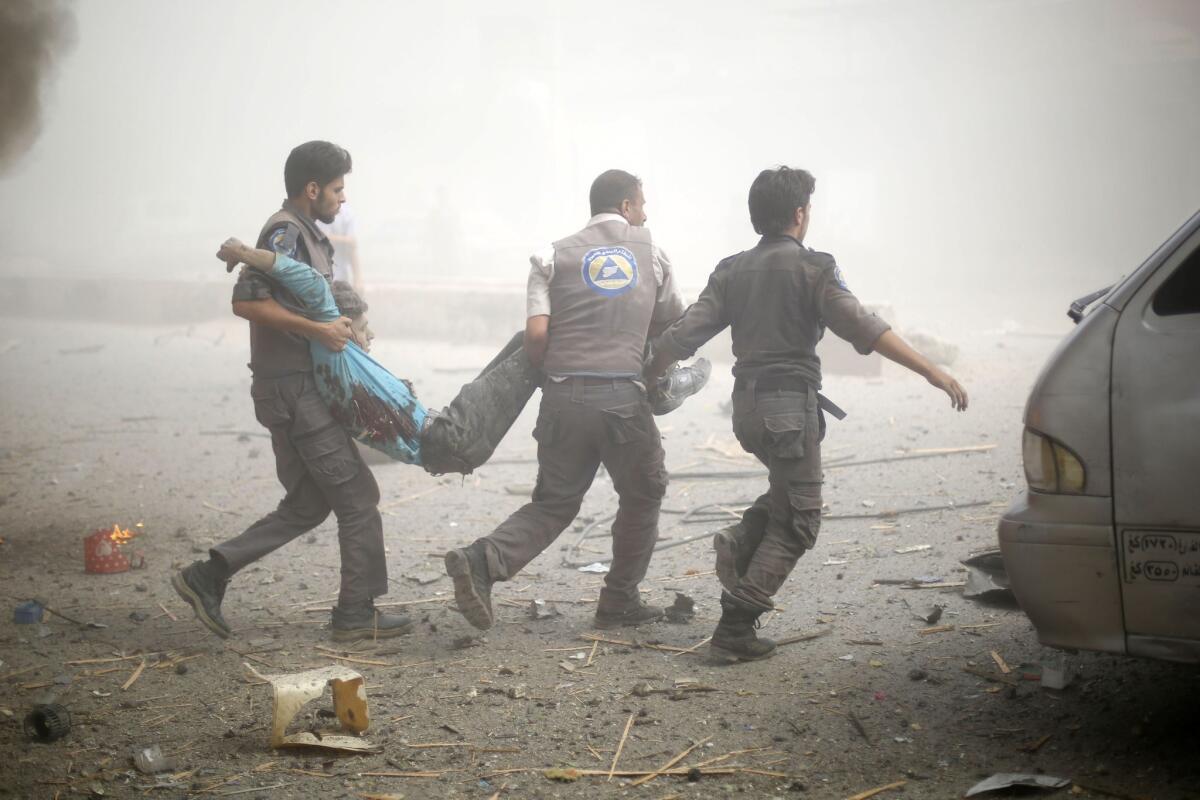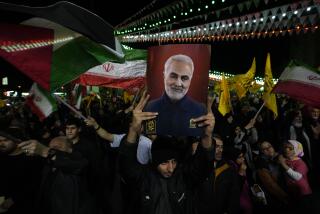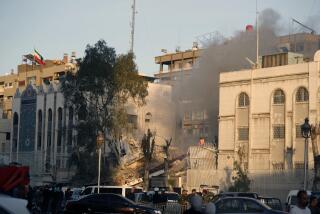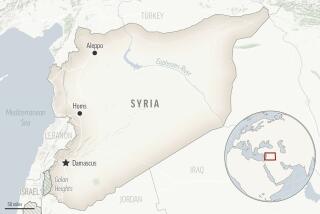Air attack hits crowded market in Syria; more than 80 dead, watchdog says

Emergency personnel carry a wounded man following airstrikes on a marketplace in a rebel-held area of Douma, Syria, on Aug. 16.
Syrian government warplanes struck a crowded market in a rebel stronghold near Damascus on Sunday, a watchdog group said, killing 82 people and wounding more than 250. The carnage unfolded even as the U.N’s top aid official began a visit to the country to assess humanitarian needs.
The Syrian Observatory for Human Rights, a Britain-based pro-opposition watchdog that documents violence in Syria, reported multiple airstrikes on the town of Douma, seven miles northeast of Damascus, the capital.
“There were at least between nine and 10 rockets from the regime’s air force that targeted a market in Douma,” Observatory head Rami Abdul Rahman said in a telephone interview. The marketplace, crowded with shoppers at the beginning of the workweek, was struck a second time after rescue crews had gathered to help the survivors, he said.
Opposition activists flooded social media with images of chaotic scenes in the aftermath of the strikes: panicked townspeople running through a street piled with rubble and the pulverized remains of overturned trucks, while one man carried a child covered in white dust.
One video showed members of the Syrian Civil Defense, an emergency response group that works in rebel-held areas, removing a blood-streaked body from the wreckage of a building to later be placed on a sheet alongside a row of corpses.
According to the Reuters news agency, an unidentified military source said the attack targeted the headquarters of Jaish Al-Islam, a Douma-based faction and a mainstay of the opposition forces arrayed against the government of President Bashar Assad. Throughout the country’s civil war, both sides have lobbed mortars and rockets at each other.
Last Wednesday, a rocket barrage on government-controlled parts of the capital left five people dead.
Abdul Rahman, however, insisted that even if “there were fighters among those killed, this does not justify killing more and wounding 330 people.”
The strikes coincided with a visit to Syria by U.N. Undersecretary-General for Humanitarian Affairs and Emergency Relief Coordinator Stephen O’Brien. He made his way to the central city of Homs, approximately 90 miles north of Damascus, after meeting with Syrian Foreign Minister Walid Muallem, according to the Syrian state news agency SANA.
O’Brien is visiting Syria to see the “humanitarian impact of” the Syrian conflict, which he described on his official Twitter page as “the largest displacement crisis globally.” More than 4 million Syrians have fled the violence, while 7.6 million are internally displaced.
Aid groups, however, are often unable to reach those affected; they often have to negotiate a bewildering landscape of intertwining areas of control by rival rebel groups. The Syrian government has also refused to give humanitarian groups access to rebel-held areas besieged by its forces. O’Brien tweeted that it was vital to have “equal access to all people in need.”
SANA quoted Muallem as questioning “some of the loyalties of those working in the humanitarian field,” and saying that this had “affected the cooperation between the Syrian government and the U.N.”
“This should stop,” he said. He added that “much of the aid given to Syria” was intended to support “the programs of those nations ... and their pawns” that have opposed Syria’s government and supported the rebellion against it.
O’Brien responded, according to SANA, by saying his visit aimed to form a “realistic image of the needs of the Syrian government and the situation on the ground” and that he was “ready to cooperate with the Syrian government.”
Bulos is a special correspondent
More to Read
Start your day right
Sign up for Essential California for news, features and recommendations from the L.A. Times and beyond in your inbox six days a week.
You may occasionally receive promotional content from the Los Angeles Times.







